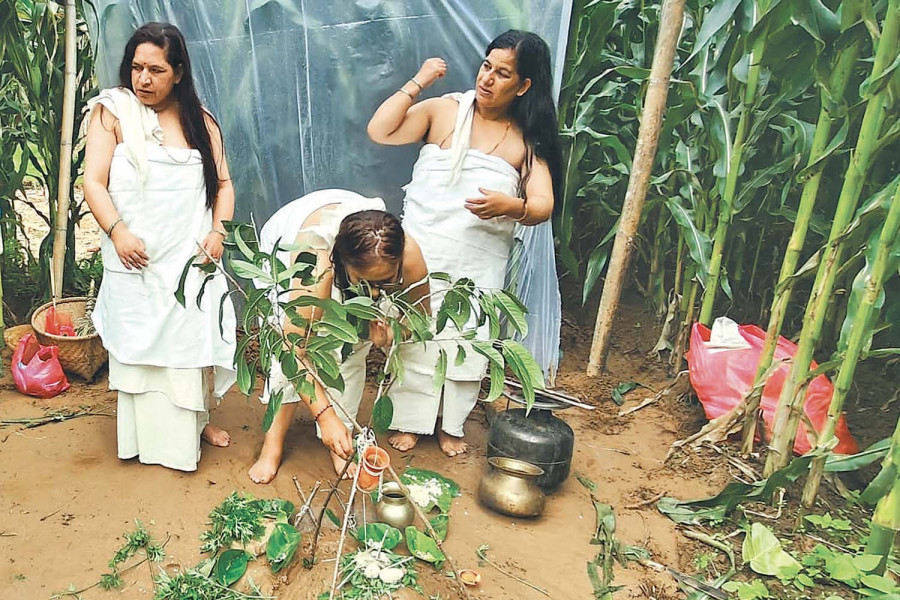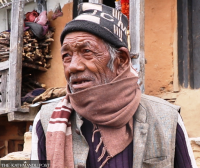National
‘We lit our father’s pyre. Then boycott began.’
Banepa women resist community pressure as they perform kriya for their deceased father.
Post Report
In Banepa municipality, Kavre, three sisters are at the centre of a storm. Not for breaking the law. For something bigger, at least, that’s what their village says.
Their crime? Breaking the so-called tradition by performing the funeral rites for their father.
On Sunday, after the death of their 91-year-old father, Hari Prasad Sapkota, daughters Bimala, Nirmala, and Radhika took the roles traditionally reserved for sons. They lit the funeral pyre and began the 13-day kriya [mourning ritual].
What followed was resistance, rather than condolences. Meetings were called in the community to discuss socially boycotting the sisters. Some villagers declared they would not enter their homes.
For Radhika Sapkota, a women’s rights activist and executive director of Sahayatri Samaj Nepal, none of this was entirely shocking. But the ferocity of the resistance, she says, has left her surprised.
“While it [right to perform death rituals] comes so easily to sons, when daughters do it, it becomes a ground-shaking issue, as if it’s a sin. The resistance made us feel like we are not in the 21st century but in the 17th.”
This was not the first time the Sapkota sisters had tried to challenge funeral gender norms.
Their mother passed away 29 years ago. The sisters, all young, Sapkota just 13 at the time, wanted to perform the rites by themselves. Their father agreed. But a distant relative, an elder in the village, intervened.
“He said, ‘It’s fine if your daughters do it, but if they do, none of us villagers will ever step in your house,’” Sapkota recalls.
Faced with the threat of social isolation, her father backed down. In the end, a male distant relative performed the ritual.
The injustice from the community members still stings her.
“People said if we daughters did it, it would not liberate my mother’s soul. But if a distant male relative did it, somehow the result would be better,” she asks. “How could his love and devotion compare to ours—her own blood?”
In the years since, they have always advocated for daughters’ right to perform funeral rites. They were also vocal about doing kriya themselves whenever questions like, “It’s a piteous situation for Hari; he has no sons, how will his kriya happen?” arose in their village.
After nearly 30 years, they hoped society had changed and things would be easier. But when their father died on Sunday, the old questions resurfaced.
Villagers asked who would carry the body, who would light the pyre, and whether daughters could perform shraddha at all.
The sisters stood firm. The village priest confirmed there was no religious prohibition against daughters performing the rites. For a brief moment, consensus seemed possible.
Though some whom the sisters considered brothers walked out of the cremation ghat halfway through, Sapkotas performed the rituals at the ghat on Sunday.
At their home, returning from the ghat, some community members came to insist that they couldn’t sit for kriya alone; at least one male should be present alongside.
After the sisters refused again, meetings were reportedly held to boycott their mourning rituals. Villagers discussed refusing to enter their homes or even look at their faces.
Then the threats started against the priest. He was told that if he guided the rituals, he would be forsaken by the villagers and never called for work again. Under pressure, he withdrew.
Sisters then found another priest, Dipak Subedi, who agreed to conduct the rites. But he, too, is facing pressure.
“He’s being asked by the villagers, ‘Why are you supporting things like this? Why did you go?” according to Sapkota.
Sapkota’s elder sister, Bimala, took to Facebook and wrote, “When will discrimination against women end? Even as we perform our own father’s funeral rites, discussions are being held to boycott us. We have interfered in no one’s lineage. Do not add to our grief.”
She warned that any attempt to obstruct them would violate the law and the constitution.
After the post, sisters received support online, which even led a few villagers to come to pay respect. But many still stay away.
“They have sworn not to look at our faces,” Sapkota says. “It has made us realise that changing the patriarchal mindset is still a long journey.”
“My sister is the deputy mayor, and all of us have good community standing. Our husbands and families are supporting us too. Yet we are facing resistance,” added Sapkota. “Imagine a lower middle class family. They may not have the privilege to resist or even have their stories told in the media.”
Sapkota says she has seen many women pressured to have multiple children until they bear a son, because of the belief that only sons can perform funeral rites. Countless daughters are forced to watch silently as distant male relatives or even ‘male’ strangers perform the rituals for their parents.
This is not a standalone case. The dogmatic beliefs and practices like barring daughters from ritual oblation, women not allowed to enter the cremation ghat, women subjected to ostracising rituals and sacrifice after a husband’s death are some common discriminatory funeral practices in many communities.
“We hope this step of ours will open a way for more positive actions and hope for women in our society,” Sapkota says.




 11.12°C Kathmandu
11.12°C Kathmandu












